“Perderei meu ranking no Google se mudar meu blog?” Essa é a pergunta número um que ouvimos sempre que alguém está pensando em mudar do Blogger para o WordPress.
Entendemos – mas depois de ajudar inúmeros blogueiros a fazer essa transição, podemos dizer com confiança: é absolutamente possível mudar do Blogger para o WordPress sem sacrificar seu ranking no Google.
Ao longo dos anos, refinamos o processo de migração para proteger seu SEO enquanto atualizamos para uma plataforma de blog mais poderosa. Através de tentativa e erro, descobrimos exatamente o que você precisa fazer (e o que evitar!) para proteger seu lugar suado nos resultados de pesquisa do Google.
Neste guia, vamos guiá-lo através do nosso método comprovado para migrar do Blogger para o WordPress. Você aprenderá as mesmas técnicas que usamos para ajudar inúmeros blogueiros como você a atualizar seus sites sem sacrificar sua visibilidade nos motores de busca.
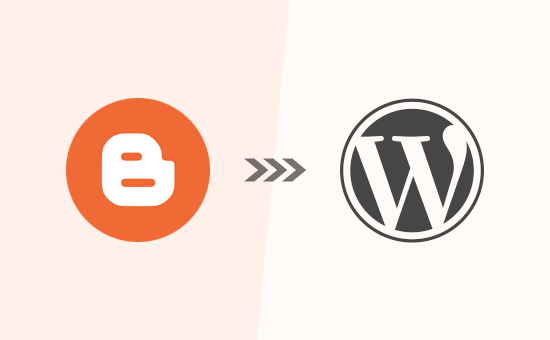
Por que mudar do Blogger para o WordPress?
Então, você está atualmente usando o Blogger, uma plataforma de blog popular criada pelo Google que permite que qualquer pessoa crie um blog gratuito com sua conta do Google.
É um ótimo ponto de partida para muitos, mas muitos iniciantes rapidamente percebem que seu blog gratuito no Blogger pode parecer um pouco limitado. Você pode se encontrar desejando poder fazer mais.
É aí que o WordPress entra. Ao contrário do Blogger, o WordPress.org lhe dá controle total sobre seu site. Ele também permite que você adicione os recursos necessários para expandir seu blog e ganhar dinheiro online. E quando se trata de ser notado no Google, o WordPress.org permite que você faça todos os ajustes importantes de SEO para melhorar seu ranking.
🌟 Quer mais informações? Reunimos uma comparação detalhada lado a lado de WordPress vs. Blogger, para que você possa ver todas as diferenças.
De acordo com nossas estatísticas de pesquisa, o WordPress é a plataforma de site mais popular do mundo e alimenta quase 43% de todos os sites.
Isso significa que, ao escolher o WordPress, você se junta a milhões de outros sites de sucesso. Você está escolhendo uma plataforma que é confiável por muitas pessoas e é perfeita para exibir seu conteúdo.
Dito isso, existem dois tipos de software WordPress, então é importante escolher o certo.
Em primeiro lugar, temos o WordPress.com, que é um construtor de sites hospedado. Com o WordPress.com, você não precisa encontrar seu próprio plano de hospedagem e instalar o software sozinho. Em vez disso, você pode escolher um plano gratuito ou comprar um dos planos pagos disponíveis, e a Automattic hospedará seu site para você.
Em seguida, há o WordPress.org, que também é conhecido como WordPress auto-hospedado. Sempre recomendamos o uso do WordPress.org porque, ao contrário do WordPress.com, você não precisa pagar por um plano caro para poder instalar plugins (pense neles como add-ons para o seu novo site WordPress!)
Dito isso, vamos dar uma olhada em como migrar corretamente do Blogger para o WordPress, preservando seus rankings de busca do Google e o tráfego do site.
Aqui estão todas as etapas que cobriremos para tornar sua migração do Blogger para o WordPress tranquila e amigável para SEO:
- Etapa 1. Contrate Hospedagem WordPress
- Etapa 2. Exporte seu Blog do Blogger
- Etapa 3. Importe do Blogger para o WordPress
- Etapa 4. Configuração de Permalinks
- Etapa 5. Configure Redirecionamentos do Blogger para o WordPress
- Etapa 6. Migre Outros Conteúdos do Blogger para o WordPress
- Etapa 7. O que fazer após a migração do Blogger para o WordPress
- Tutorial em Vídeo
Pronto? Vamos começar.
Etapa 1: Inscreva-se para Hospedagem WordPress
Para começar com o WordPress, você precisará de um nome de domínio e hospedagem de sites.
Para um rápido lembrete, um nome de domínio é o endereço do seu site que as pessoas digitam para acessar seu blog, e a hospedagem de sites é onde os arquivos do seu site são armazenados. Ambos são ESSENCIAIS para criar qualquer tipo de blog ou site.
Dito isso, recomendamos o uso de Bluehost. Eles são uma das maiores empresas de hospedagem do mundo e são um parceiro de hospedagem WordPress oficialmente recomendado.

Como o WPBeginner é o maior site de recursos WordPress, eles concordaram em oferecer aos nossos leitores um nome de domínio gratuito e um desconto de 70% na hospedagem. Basicamente, você pode começar por apenas US$ 2,99 por mês.
Se você preferir usar uma alternativa à Bluehost, recomendamos usar SiteGround ou Hostinger, pois ambos são excelentes soluções (na verdade, usamos SiteGround para hospedar o WPBeginner!)
Depois de se inscrever no plano de hospedagem WordPress e configurar seu nome de domínio, você pode prosseguir para a etapa de instalação do WordPress.
Se você se inscrever na Bluehost usando nosso link acima, eles instalarão o WordPress para você automaticamente.
Se você usou um provedor de hospedagem WordPress diferente, você precisará instalar o WordPress seguindo nosso guia definitivo sobre como instalar o WordPress.
Depois de instalar o WordPress, é hora de migrar seu conteúdo do Blogger para o WordPress.
🧑💻 Ouvimos você alto e bom som! Como muitos de vocês pediram, estamos animados em anunciar que agora oferecemos um serviço de migração totalmente GRATUITO de Blogger para WordPress como parte da nossa configuração gratuita de blog WordPress! Isso mesmo – um dos membros da nossa equipe especializada irá cuidar de tudo para você, gratuitamente. Você pode literalmente fazer a mudança do Blogger para o poderoso mundo do WordPress sem nenhum aborrecimento ou risco.
Nosso serviço gratuito de migração do Blogger é perfeito para blogs menores com menos de 1000 posts. Se você tem um site Blogger maior, não se preocupe! Ainda podemos ajudar com a migração, mas seria um serviço pago.
Passo 1: Exportar seu Blog Blogger
A primeira coisa que você precisa fazer é exportar o conteúdo do seu blog Blogger. Você pode fazer isso visitando o site do Blogger e fazendo login no painel da sua conta.
Depois disso, vá para a página Configurações. Role para baixo até a seção ‘Gerenciar Blog’ e clique no botão ‘Fazer backup do conteúdo’.
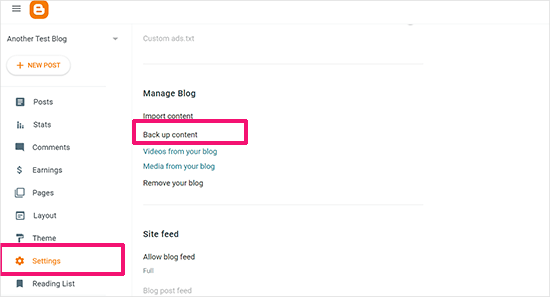
Isso abrirá um pop-up mostrando exatamente o que está incluído no backup do Blogger.
Você precisa clicar no botão ‘Download’ para continuar.
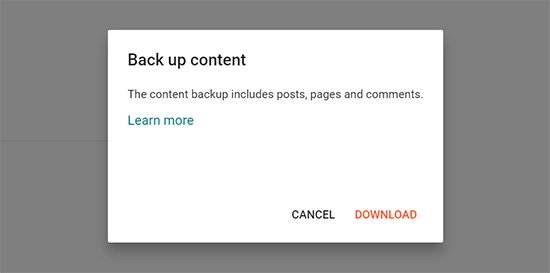
O conteúdo do seu blog Blogger será baixado para o seu computador em um arquivo XML.
Assim que o download for concluído, é hora de importar seu conteúdo do Blogger para o seu site WordPress.
Passo 2: Importar do Blogger para o WordPress
Para começar a importar seu site Blogger para o WordPress, faça login na sua área de administração do WordPress e visite Ferramentas » Importar.
Na página de Importação, clique no link ‘Instalar agora’ abaixo de Blogger.
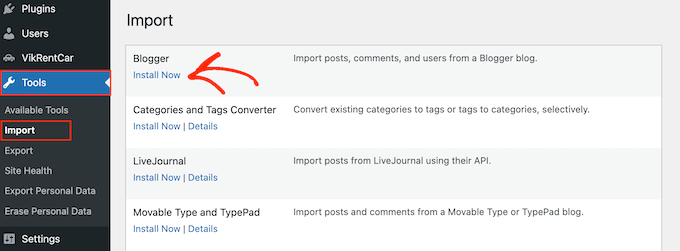
O WordPress agora fará o download e instalará o plugin Importador do Blogger para você.
Assim que terminar a instalação, você precisa clicar no link ‘Executar importador’ para continuar.
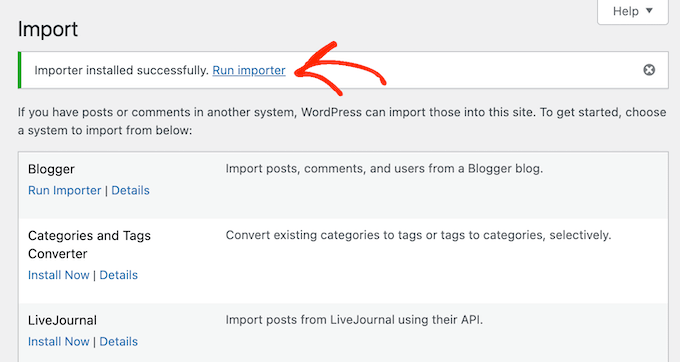
O WordPress pedirá para você fazer o upload do arquivo XML na tela de Importar Blogger. Este é o arquivo que você baixou no Passo 1.
Simplesmente clique no botão ‘Escolher arquivo’ e faça o upload do arquivo XML que você baixou anteriormente.
Em seguida, clique no botão ‘Upload file and import’ para continuar.
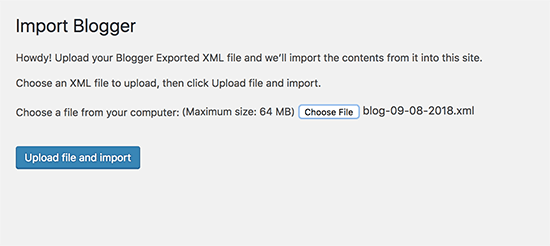
O WordPress agora fará o upload do arquivo de importação. Se o seu arquivo de importação for muito grande, você poderá ver uma mensagem de erro.
Nesse caso, você precisará aumentar o seu limite máximo de upload de arquivos. Se o seu arquivo for pequeno, você não verá nenhum erro.
Em seguida, você será solicitado a atribuir posts a um autor. Se você tiver vários autores em seu blog do Blogger, poderá criar uma nova conta de usuário para cada autor. Você também pode atribuir esses posts a autores existentes em seu site WordPress.
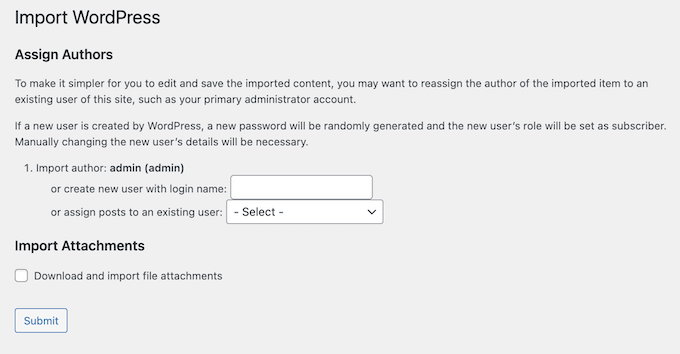
Após fazer sua seleção, clique no botão ‘Submit’ para continuar.
O WordPress importará todo o conteúdo do arquivo de exportação do Blogger para o seu site WordPress. Você pode visualizar o conteúdo visitando a página Posts » Todos os Posts.
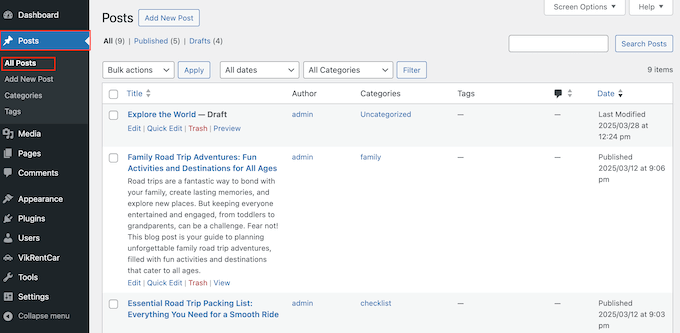
Passo 3: Configurando Permalinks
Permalinks é o termo usado para a estrutura de URL de páginas individuais. O WordPress vem com um recurso que permite configurar uma estrutura de URL amigável para SEO.
Como você está importando conteúdo do Blogger, precisa que sua estrutura de URL seja o mais próxima possível da estrutura de URL do seu antigo site Blogger.
Para definir permalinks, você precisa ir para Configurações » Permalinks no seu painel do WordPress e escolher a opção ‘Estrutura personalizada’.
Depois disso, você precisa adicionar o seguinte texto na caixa ao lado do campo de estrutura personalizada:
/%year%/%monthnum%/%postname%.html
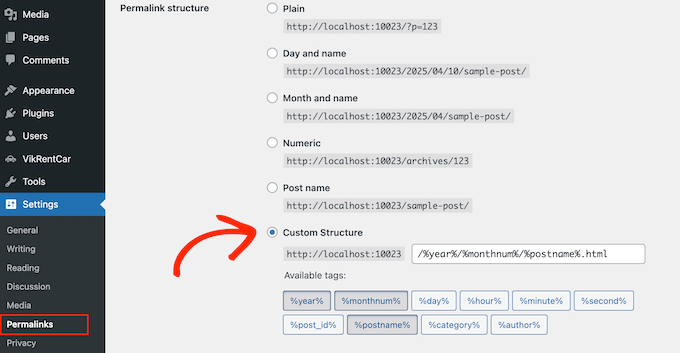
Esta estrutura de permalink torna os URLs dos seus posts semelhantes aos URLs do seu antigo blog Blogger.
No entanto, às vezes o URL do seu post, também conhecido como slug no WordPress, não corresponderá aos slugs usados pelo Blogger.
Para corrigir isso, você precisará criar e executar um pequeno trecho de código.
Recomendamos adicionar este código PHP usando o plugin WPCode. É a maneira mais segura de adicionar código personalizado ao seu site WordPress. Para mais detalhes, consulte nosso guia sobre como copiar e colar trechos de código no WordPress.
add_action( 'init', 'wpb_update_slug' );
function wpb_update_slug() {
global $wpdb;
$result = $wpdb->get_results("SELECT post_id, meta_value FROM $wpdb->postmeta WHERE meta_key = 'blogger_permalink' ");
$wpdb->print_error();
foreach ($result as $row){
$slug = explode("/",$row->meta_value);
$slug = explode(".",$slug[3]);
$wpdb->query("UPDATE $wpdb->posts SET post_name ='$slug[0]' WHERE ID = '$row->post_id' ");
}
echo "DONE";
}
Após salvar o código, você só precisa visitar qualquer página do seu site WordPress para acionar este script. Depois que o script for executado, não se esqueça de desativá-lo ou excluí-lo da sua biblioteca WPCode, pois ele só precisa ser executado uma vez.
Etapa 4: Configure Redirecionamentos do Blogger para o WordPress
A etapa mais importante na migração de qualquer site é configurar o redirecionamento adequado para que você não perca tráfego existente ou classificações de SEO. Você pode consultar nossa lista de verificação definitiva de migração de SEO do WordPress para iniciantes para mais detalhes.
⚠️ Se o seu blog Blogger tiver seu próprio domínio personalizado em vez de blogspot.com, você pode precisar apontar os nameservers do seu domínio para seu provedor de hospedagem. Para obter instruções, siga nosso tutorial sobre como mudar um blog Blogger com domínio personalizado para o WordPress.
A parte crucial do redirecionamento é garantir que seus usuários cheguem à mesma página no novo domínio que estavam tentando acessar no site antigo.
Ao mesmo tempo, você também precisa garantir que os mecanismos de pesquisa entendam que seu site foi movido para este novo local.
Você precisa instalar e ativar o plugin Blogger to WordPress Redirection para fazer isso. Para mais detalhes, consulte nosso guia passo a passo sobre como instalar um plugin do WordPress para iniciantes.
Ao ativar, você precisa visitar a página Ferramentas » Redirecionamento do Blogger para WordPress e clicar no botão ‘Iniciar Configuração’.
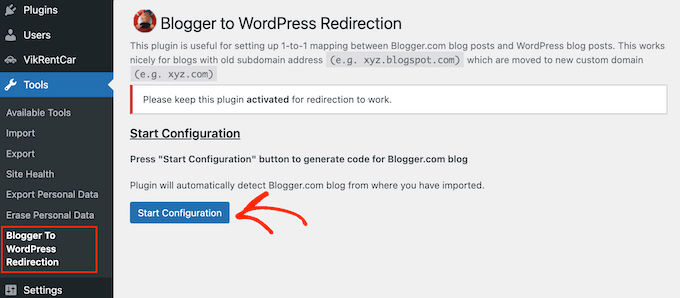
O plugin agora detectará o URL do seu blog Blogger e mostrará a opção de obter um código de redirecionamento. Clique no botão ‘Obter Código’ ao lado do seu URL do Blogger.
Ele agora gerará um trecho de código que você precisa para redirecionar corretamente os usuários do seu antigo blog Blogger para o seu novo site WordPress.
Em seguida, você precisa fazer login no seu painel do Blogger e ir para a página ‘Temas’. Clique na seta suspensa no botão ‘Personalizar’ ao lado do seu tema e, em seguida, selecione a opção ‘Editar HTML’.
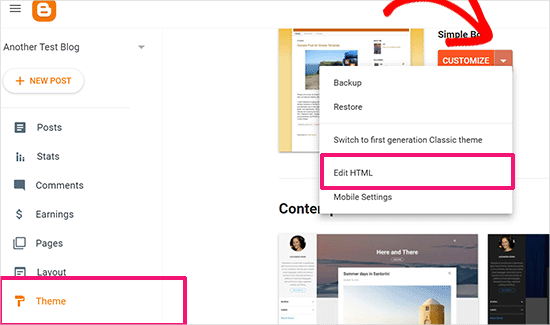
O Blogger agora exibirá o código HTML personalizado para o seu modelo de tema. Se você fez alguma personalização no seu tema do Blogger, talvez queira copiar o código e salvá-lo no seu computador como backup.
Caso contrário, você pode simplesmente excluir tudo. Depois disso, copie o código exibido pelo plugin no seu site WordPress e cole-o no editor de temas do seu Blogger.
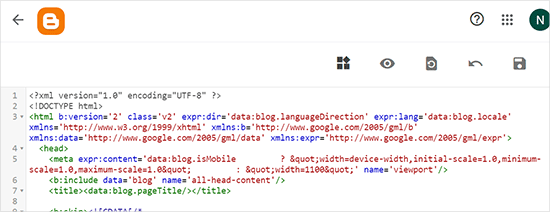
Não se esqueça de clicar no botão ‘Salvar tema’ para armazenar suas alterações.
Em seguida, precisamos configurar os redirecionamentos para usuários de dispositivos móveis.
Você precisa voltar para a página Temas no painel do seu blog Blogger. Desta vez, você precisa clicar no botão de engrenagem abaixo da prévia móvel do seu blog.
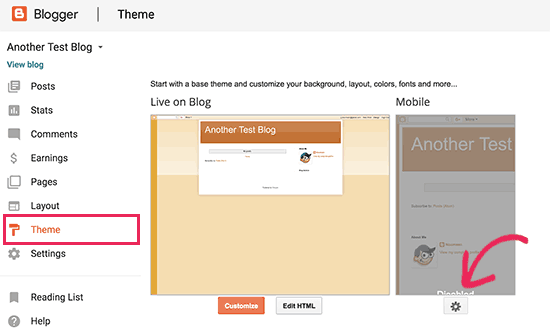
Isso abrirá um pop-up onde você precisa selecionar a opção ‘Não. Mostrar tema de desktop em dispositivos móveis’.
Em seguida, clique no botão ‘Salvar’.
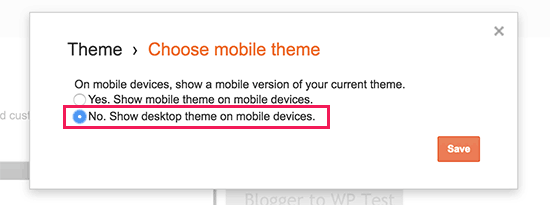
Pronto, seu blog Blogger agora redirecionará todos os seus visitantes para o seu novo blog WordPress.
Alternativamente, você também pode usar o All in One SEO (AIOSEO) para redirecionar posts e páginas do Blogger para o WordPress. O plugin oferece um poderoso recurso de gerenciamento de redirecionamento que permite configurar redirecionamentos completos do site para o seu novo site.

Além disso, você pode habilitar o rastreamento de erros 404 e capturar quaisquer links quebrados que possam ocorrer ao mover seu site para o WordPress. Isso ajudará a melhorar a experiência do usuário e você não perderá classificações de palavras-chave.
Usamos o AIOSEO para gerenciar todas as nossas páginas e posts do WPBeginner – e, honestamente? Ficamos impressionados com os resultados. É por isso que é nossa recomendação para todos vocês.
Para saber mais sobre nossas experiências, confira nossa revisão detalhada do AIOSEO.
Passo 5: Movendo Outro Conteúdo do Blogger para o WordPress
Nesta etapa, moveremos o conteúdo restante do blog antigo no Blogger para o seu novo blog WordPress. Isso pode exigir algum trabalho manual, dependendo das configurações/conteúdo do seu blog.
1. Movendo Páginas do Blogger para o WordPress
A ferramenta de importação do Blogger do WordPress importa apenas posts do Blogger e ignora páginas.
Para mover suas páginas para o WordPress, você terá que editar cada página no seu blog Blogger, copiar seu conteúdo e, em seguida, criar manualmente uma página no WordPress.
Para saber mais sobre páginas, consulte nosso artigo sobre a diferença entre posts e páginas no WordPress.
Agora, você encontrará outro problema. As páginas do Blogger têm URLs que se parecem com isto:
http://example.blogspot.com/p/about-us.html
O URL da sua página WordPress ficará assim:
http://example.com/about-us
Para corrigir isso, você precisará usar o plugin All in One SEO (AIOSEO). Para instruções, consulte nosso guia para iniciantes sobre como criar redirecionamentos no WordPress.
2. Widgets
Assim como o Blogger, alguns temas WordPress também utilizam widgets para adicionar conteúdo à barra lateral do seu blog.
Para adicionar widgets, você precisa visitar a página Aparência » Widgets no seu painel do WordPress e simplesmente arrastar/soltar widgets nas barras laterais. Para instruções detalhadas, veja nosso guia sobre como adicionar e usar widgets no WordPress.
Se você está procurando por um widget específico que não vê no WordPress por padrão, então você provavelmente precisa de um plugin do WordPress. Você pode pesquisar na categoria de melhores plugins do WordPress do WPBeginner para encontrar a funcionalidade que você deseja.
3. Feeds RSS
Mecanismos de busca e usuários que assinam suas postagens de blog via feeds RSS ainda poderão encontrar seu blog. No entanto, eles não receberão nenhum conteúdo novo.
Para corrigir isso, visite a página Configurações na sua conta do Blogger. Em seguida, role para baixo até a seção 'Feed do site' e clique em 'URL de redirecionamento do feed de postagens'.
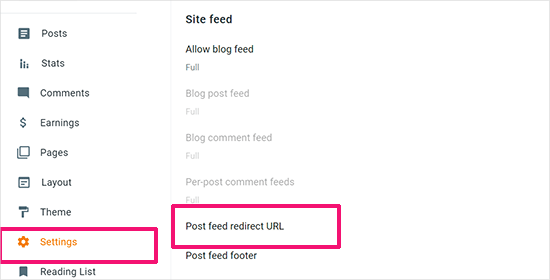
Isso abrirá um pop-up onde você precisará adicionar o URL do feed RSS do seu site WordPress.
O URL do seu feed do WordPress ficará assim:
http://example.com/feed
Não se esqueça de substituir example.com pelo nome do seu próprio domínio.
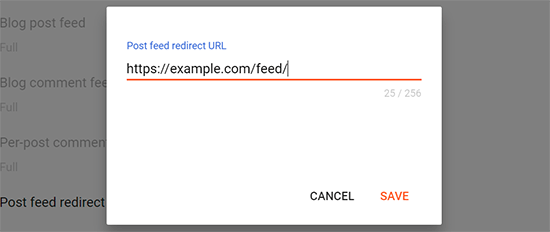
Clique no botão ‘Salvar’ para adicionar o URL e salvar suas configurações.
Etapa 6. O que fazer após migrar do Blogger para o WordPress
Agora que você moveu com sucesso seu blog do Blogger para o WordPress, vamos dar uma olhada no que mais você pode fazer para melhorar seu blog.
Criamos uma lista de verificação das coisas mais importantes que você precisa fazer após instalar o WordPress.
O WordPress é bastante fácil de usar. No entanto, ocasionalmente você descobrirá coisas novas com as quais pode precisar de ajuda. É aqui que o WPBeginner entra.
O WPBeginner é o maior site de recursos gratuitos do WordPress do mundo. Publicamos regularmente tutoriais e guias escritos especificamente para blogueiros e pequenas empresas.
Aqui estão alguns dos recursos úteis que você encontrará no WPBeginner (todos eles são gratuitos):
- Blog WPBeginner – O local central para todos os nossos tutoriais e guias do WordPress.
- Dicionário WPBeginner – Nosso glossário do WordPress é o melhor lugar para se familiarizar com a linguagem do WordPress
- Vídeos WPBeginner – Novos usuários do WordPress podem começar com estes vídeos passo a passo para dominar o WordPress.
- WPBeginner no YouTube – Precisa de mais instruções em vídeo? Inscreva-se em nosso canal do YouTube com mais de 291.000 inscritos e mais de 50 milhões de visualizações.
- Blueprint WPBeginner – Confira os plugins, ferramentas e serviços que usamos no WPBeginner.
- WPBeginner Deals – Descontos exclusivos em produtos e serviços WordPress para usuários do WPBeginner.
Tutorial em Vídeo
Esperamos que este artigo tenha ajudado você a mudar do Blogger para o WordPress sem afetar seus rankings de pesquisa do Google. Você também pode querer ver nosso guia sobre qual plano do WordPress você deve usar ou os mitos mais comuns do WordPress desmistificados.
Se você gostou deste artigo, por favor, inscreva-se em nosso Canal do YouTube para tutoriais em vídeo do WordPress. Você também pode nos encontrar no Twitter e no Facebook.





Marco Dickert
Olá,
Acabei de tentar migrar meu blog do Blogger para o meu WordPress auto-hospedado. Quase tudo funciona como esperado, mas não o redirecionamento do Blogger. Inseri uma função de log no código do template para a interface do lado do WordPress e percebi que esta página não recebe nenhum parâmetro do redirecionamento do Blogger. Isso significa que sou simplesmente redirecionado para a minha página inicial.
É possível que o Blogger tenha mudado os nomes das variáveis ou algo assim? Alguém tem alguma ideia de como posso consertar esse problema?
Abraços, Marco
WPBeginner Support
Marco, acabamos de atualizar o post com uma versão completamente reescrita. Por favor, siga-a agora, esperamos que isso resolva seu problema.
Admin
Marco Dickert
@WPBEGINNER Suporte:
Antes de mais nada: É muito bom que vocês tenham atualizado este artigo! Acho que vocês ajudam muitos usuários com isso.
Enquanto isso, resolvi meu problema e escrevi minha solução em um e-mail para Amit Agarwal, mas ele parece estar muito ocupado.
Como venho da Alemanha, não obtenho domínios “blogspot.com” nos meus resultados de pesquisa do Google, mas sim “blogspot.de”. Outros na Europa de língua alemã também obtêm TLDs diferentes como “blogspot.at” ou “blogspot.ch”. Isso é um problema para o código do template. Eu poderia corrigir isso simplesmente alterando estas linhas:
$tld_fix = preg_replace("/blogspot\.[a-zA-Z0-9]+/", "blogspot.com", $old_url); $permalink = explode("blogspot.com", $tld_fix);Com este conserto, deve funcionar em todo o mundo. Talvez vocês possam implementá-lo em seu post; pode ser útil para algumas pessoas.
Abraços, Marco
WPBeginner Support
Obrigado Marco por este conserto realmente útil. Atualizamos o artigo para incluí-lo.
nil
Olá,
Tenho o mesmo problema. Tentei seu script, mas quando vou para uma postagem antiga, sou apenas redirecionado para minha primeira página, não para a postagem.
Atenciosamente
nil
Liza Pritz
Não seria mais fácil usar um plugin? Algo como “CMS2CMS Blogger to WordPress Converter”? Com este plugin, é possível migrar o conteúdo, configurar o redirecionamento 301 e manter todos os visitantes e o ranking em um novo site WordPress?
Alguém sabe algo sobre isso?
Saad Ansari
Bons esforços. Um guia de uma parada para migração do Blogger para o WordPress.
Existe alguma maneira de importar todas as imagens do Blogger e colocá-las todas juntas no WordPress? Tenho um grande número de imagens comigo. Fazer o upload de cada uma delas MANUALMENTE seria um pesadelo, não é? Então, por favor, me diga se existe algum plano B inteligente e eficiente para isso. Obrigado!
Xuhair Raxa
ótimo post!!! mas tenho uma pergunta.. é que após a conversão, o domínio será .com ou blogspot.com? Como tenho um blog http://tricksnsolutions.com que é um blog wp, depois de transformá-lo em um blog do Blogger, ele permanecerá como tricksnsolutions.com ou tricksnsolutions.blogspot.com? por favor, resolva minha confusão
WPBeginner Support
Este guia é para mudar do Blogger para o WordPress, não o contrário.
Admin
Briana M
Meu site antigo está no Blogger, mas estou migrando para o Wordpress e usando um novo nome de domínio. Já tenho centenas de cartões de visita com meu nome de domínio antigo listado (###.blogspot.com) e quero que o nome de domínio antigo através do Blogger redirecione para meu novo nome de domínio e site Wordpress. Como posso fazer isso?
WPBeginner Support
Você pode fazer isso seguindo os passos mencionados no artigo acima.
Admin
Kanchana
obrigado,,,
Bryan
Olá,
Eu sou um novato.
Eu só queria fazer uma pergunta rápida:
Quando eu importar meus posts do Blogger para o WordPress, eles serão excluídos do Blogger ou ainda estarão lá sem alterações?
Obrigado
WPBeginner Support
Eles ainda estarão lá se você não os excluir explicitamente.
Admin
Christian
Oi!
O código do Blogger não funciona hoje. Acho que a marcação está obsoleta porque o Blogger diz o seguinte ao enviar o código do WP Beginner:
“O valor do atributo “dir” associado a um tipo de elemento “html” não deve conter o caractere '<'”.
Eu apenas substituí aspas simples e duplas e outras formas de resolver isso, mas é completamente impossível. Alguém sabe se o Blogger fez alguma alteração relacionada à marcação?
Obrigado a todos.
hafzaa
Muito bem explicado… vou tentar… espero que funcione…
Kapil Dev Singh
Eu migrei do Blogger para o WordPress e realizei todos os passos. Estou encontrando dois problemas-
1. O link do Blogger para blogs específicos não está me levando para o WordPress
2. Quando alguém quer vir para o WordPress seguindo um link de blog específico, aparece – o arquivo não pôde ser encontrado e dá uma lista de todos os blogs publicados. Uma vez clicado no blog específico para o qual o link foi seguido, ele abre.
Atenciosamente
Desi
Continuo recebendo esta mensagem no Blogger
Erro ao analisar XML, linha 2, coluna 73: O valor do atributo “dir” associado a um tipo de elemento “html” não deve conter o caractere “<”.
mais alguém?
Carl
(Comentário anterior não incluiu código… como posso fazer isso?)
Não tenho certeza se algo mudou fundamentalmente com o importador do Blogger ou como as informações das postagens são armazenadas no banco de dados; Mas o código acima para o wpbeginner-blogger.php falhou para quase todos os meus links. Acabei mudando para isto:
<?php /* Template Name: Blogger Redirect (do not use) */ global $wpdb; $old_url = $_GET['q']; if ($old_url != "") { $permalink = explode("blogspot.com.au", $old_url); $new_url = $permalink[1]; header ("HTTP/1.1 301 Moved Permanently"); header("Location: $new_url"); } ?>Alguém vê algum motivo para isso ser ruim? Parece funcionar perfeitamente, ainda estou tentando descobrir por que foi feito de outra forma para começar... Desde que você corrija os permalinks para corresponder aos antigos do Blogger
Dean
Olá, espero que alguém possa ajudar. Sempre que clico em um dos meus posts antigos do Blogger, ele me envia para a página inicial do meu novo site WordPress, e não para o post correto? Alguma ideia de como consertar isso. obrigado.
Raj Amal
Meus posts antigos do Blogger me enviam para a página inicial do meu novo site WordPress, e não para o post correto. Por favor, me ajude
Paige
Estou tendo os mesmos problemas. Como você consertou isso?
Sanskar
Estou preso no loop infinito. O site continua atualizando e nunca carrega. Não tenho certeza de como consertar.
Sanskar
Ok, sinto muito pelo comentário anterior. Eu estava usando o plugin Switch hosts do Firefox e navegando na minha cópia local. Meu site ainda não foi publicado. Embora eu tenha clicado no botão Go live no Godaddy, e pareça que as configurações de DNS foram atualizadas, meu site entrou em um loop infinito e nunca carrega. Ele carrega o título, carrega o favicon e eu também vejo extensões do Chrome como Alexa e Adblock carregando, mas então ele atualiza e começa a carregar novamente. Isso nunca para.
Você acha que é um problema com o DNS? Ou que eu não segui o tutorial corretamente? Já se passaram 11 horas desde que atualizei o DNS. Tanto meu domínio quanto a hospedagem são comprados no Godaddy.
WPBeginner Support
Usando um cliente FTP, conecte-se ao seu site e baixe o arquivo .htaccess para o seu computador. Em seguida, exclua o arquivo do seu site ativo. Veja se isso resolve o problema. Se resolver, isso significa que não há nada de errado com as configurações de DNS do seu site e provavelmente foi um problema de redirecionamento. Você também pode entrar em contato com seu provedor de hospedagem para obter suporte se isso não resolver seu problema.
Admin
Gari Anne
Tudo funcionou perfeitamente! Obrigado! Por quanto tempo devo deixar a página publicada "Blogger" no meu novo blog WordPress? Ou existe uma maneira de ocultar essa página?
Carol
Eu ainda estou tendo os mesmos problemas, mas nenhum dos meus comentários foi publicado ou respondido. O cara que escreveu esta postagem desistiu dela? Notei que algumas pessoas tiveram o mesmo problema – é algo que pode ser corrigido? Seria ótimo receber uma resposta.
Obrigado
carol
ok – eu tenho reenviado o documento de texto repetidamente e uma coisa que mudou é – eu estou usando um Mac e meu documento é .rtf. Quando eu tiro o .rtf depois do .php, recebo o código de erro da linha 16, mas se eu mantiver o .rtf depois do .php e clicar em qualquer uma das minhas postagens do Blogger, ele redireciona para a página do Blogger que eu criei para o redirecionamento no meu novo site. Isso faz sentido? Eu não entendo nada sobre esse negócio de php, então não tenho ideia de por que isso aconteceria apenas adicionando ou excluindo a extensão .rtf – mas é isso que acontece.
Espero que você tenha alguma ideia de como posso consertar isso. Parece algo bem simples – eu só não sei o quê.
carol
eu acabei de refazer toda a parte da instalação do cpanel e agora o erro de sintaxe diz linha 16
Parse error: syntax error, unexpected T_STRING in /home4/craftyc/public_html/wp-content/themes/suffusion/wpbeginner-blogger.php on line 16
carol
Eu acabei de passar por todo o processo e quando clico em “Ver Blog” na minha página do Blogger, ele redireciona perfeitamente para o meu site (oba!), mas se eu clicar em qualquer uma das postagens individuais, recebo esta mensagem de erro:
Parse error: syntax error, unexpected T_STRING in /home4/craftyc/public_html/wp-content/themes/suffusion/wpbeginner-blogger.php on line 15
Eu vi algumas pessoas aqui tendo erros de sintaxe em linhas diferentes, mas não vi nada para consertar isso.
Besplatne Knjige
Olá!
Eu tenho este blog no Blogger e gostaria de construir alguns backlinks em um blog do WordPress. Existe alguma maneira de criar um blog no WordPress e postar automaticamente partes do meu post original do Blogger com o meu link. Algo como postar automaticamente em redes sociais...
Espero que você entenda o que eu quero (meu inglês não é muito bom)
Obrigado
nick
Olá, estou prestes a realizar este processo, mas tenho uma preocupação. Meu endereço do Blogger não tem o blogspot.com anexado a ele. Paguei para ter o domínio mostrando apenas o nome do meu blog. No entanto, ainda edito meu blog com o Blogger. Agora quero mudar e estou me perguntando se há alguma etapa que preciso fazer de forma diferente para não ter problemas.
obrigado
Sharon
Tenho a mesma situação. Já comprei meu domínio, mas ainda o hospedo no Blogger e quero mudar, mas não sei se devo seguir os mesmos passos discutidos aqui neste post. Qualquer ajuda é muito apreciada.
Jackie Montalvo
Tenho o mesmo problema, então adoraria saber quais são minhas opções, porque eu queria mudar, mas não tinha certeza se poderia, já que já comprei o nome de domínio. Por favor, me avise!
WPBeginner Support
Você pode gerenciar seu domínio personalizado no site do registrador. Atualmente, o Blogger parou de oferecer registro de domínio personalizado na interface do Blogger, então a maioria dos usuários precisa comprar um domínio de outro registrador e, em seguida, configurar o domínio para apontar para os servidores do Google. Ao mover este domínio para um novo host da web, você precisa remover essas configurações do painel de controle do seu domínio no site do registrador.
1. Primeiro, descubra seu registrador de domínio.
2. Faça login no painel de controle do seu registrador de domínio.
3. Remova as configurações de registro CNAME e A que apontam para os servidores do Google.
4. Insira as configurações do seu novo provedor de hospedagem no painel de controle do domínio.
A maioria dos provedores de hospedagem WordPress oferece guias detalhados sobre como mover um nome de domínio para apontar para seus servidores.
Admin
Holt Johnson
Achei o plugin Blogger To WordPress muito mais simples de usar.
http://wordpress.org/plugins/blogger-to-wordpress-redirection/
Amanda
Thank you SO much for posting that plugin …. I was going crazy trying different tutorials with none of them working!
Naomi Madelin
Tentei isso, mas recebo a mensagem do WordPress de que não consigo acessar o Conteúdo nem mexer nos Temas de forma alguma. Então, agora estou preso!
Sagar
Olá!
Eu quero migrar um blog do Blogger para o WordPress que tem apenas 15 páginas, sem posts, então posso fazer isso manualmente, mas quero saber sobre redirecionamento 301, como faço isso? Por favor, você pode me ajudar com isso?
Elaine Griffin
Estou muito confuso, porque quando vou em ferramentas -> importar, sou solicitado a baixar um plugin. Alguma ideia?
Obrigado!
Equipe Editorial
Sim, você tem que fazer isso.
Admin
Emma
Alguém sabe se é possível importar de 2 blogs diferentes do Blogger para um único WP?
Jan Bear
Obrigado por um post útil.
Quando você terminar este processo, você poderá fazer futuras postagens de blog no WordPress, ou terá que continuar usando o Blogger como sua plataforma de blog?
Isso integra os posts dos blogs WordPress e Blogger? Ou eles ficarão em páginas separadas do novo site?
Equipe Editorial
Você teria que usar o WordPress para todos os novos posts.
Admin
Wendi Gratz
Deixe pra lá – eu descobri. Para aqueles que encontrarem o mesmo problema. . .
Ao copiar e colar o código PHP, certifique-se de que não haja uma linha em branco acima do início do <?php.
Não sei se o meu apareceu durante a cópia ou colagem – mas eu o removi e tudo funciona perfeitamente agora.
Lenin
Para alguns usuários, todos os posts do blogspot podem ser redirecionados para a página inicial do novo blog (e não para o URL do novo post individual). Isso ocorre porque o link original é blogspot.in e não blogspot.com
Para corrigir esse problema, adicione a seguinte linha de código após o link $permalink = explode(“blogspot.com”, $old_url);
if(count($permalink) == 1) //não conseguimos encontrar blogspot.com na URL, vamos tentar blogspot.in
{
$permalink = explode(“blogspot.in”, $old_url);
}
Tim
Ótimo post. Infelizmente, depois de fazer isso, o Google marcou meu antigo blog do Blogger como um blog de spam! Estou passando pelo processo para desbloqueá-lo, então espero que isso resolva. Ótimo tutorial e muito simples de seguir – obrigado!
John Pile
Este é um tutorial passo a passo realmente ótimo. Infelizmente, perdi um dos links do wpbeginner.com no template de substituição do meu site do Blogger. Isso resultou no redirecionamento para o seu site, que então levou o Blogger a marcar meu blog imediatamente como SPAM.
Eu corrigi o template e agora tudo redireciona corretamente, mas tive que solicitar que meu blog fosse revisado ou ele será excluído em 22 dias.
Estou me perguntando se mais alguém já passou por esse problema e como foi o processo de revisão? Usei um dos meus sites de teste para isso, então não ficarei incrivelmente decepcionado se o site original do blog for excluído, mas eu queria oferecer este aviso a outros. Recomendo usar CTRL-F para substituir todas as ocorrências de wpbeginner.com no modelo.
-John
Tim
Substituí todas as instâncias e ainda assim marcou meu antigo blog como spam. Deve ser apenas o fato de estar fazendo um redirecionamento completo que os faz pensar que pode ser spam. Acabei de iniciar o processo de revisão, então terei que ver como vai. O seu voltou ok no final?
R. endymion
Olá, eu também substituí todas as instâncias, mas ainda está marcado como SPAM. Alguém encontrou uma solução para isso?
Obrigado.
R. endymion
Eu reportei para o Google e eles mudaram em apenas um dia. Precisamos apenas ter paciência.
jose morales
Baixei todo o meu site no Blogger, mas ele não está mostrando o artigo inteiro… alguma ideia?
Salue
fiz tudo isso OBRIGADO
estava pensando em 1 coisa, posso excluir a página do Blogger que criei? porque ela está aparecendo na barra de menu, tipo ao lado de sobre mim
zed kosnar
Olá novamente! consegui corrigir o outro erro, e agora sou redirecionado do Blogger para o WordPress, mas se eu clicar em um post antigo do Blogger, recebo esta mensagem “Parse error: syntax error, unexpected T_LNUMBER in /nfs/c09/h01/mnt/127155/domains/desdeabajo.net/html/wp-content/themes/twentyeleven/WPBeginner-Blogger.php on line 5” espero que você possa me guiar aqui… Obrigado antecipadamente!
zed kosnar
Olá!
Segui as instruções, mas quando postei o HTML (passo 5) e tentei verificar "uma prévia", recebi esta mensagem: "Seu modelo não pôde ser analisado, pois não está bem formado. Certifique-se de que todos os elementos XML estejam fechados corretamente. Mensagem de erro XML: O comentário deve começar com "<!–".
Erro 500". Verifiquei os dados novamente e ainda recebo esta mensagem, não salva se eu clicar para prosseguir… Alguma ideia do que posso estar fazendo de errado? Obrigado!
David
Oi, no passo 5 recebo esta mensagem:
Erro ao analisar XML, linha 3, coluna 73: O valor do atributo “dir” associado a um tipo de elemento “null” não deve conter o caractere ‘<’.
Você pode ajudar?
nick
resolver este problema? estou tendo o mesmo erro
Alexander
O problema ocorre se você não pressionar “Reverter para modelo clássico”. Mesmo que você não tenha alterado o modelo no início, você tem que reverter para o modelo clássico, então deve funcionar.
Joanna Mecina
Olá, eu tenho um modelo do Blogger, como posso convertê-lo para WordPress? Obrigado
Linda Leyble
Oi – post muito bom. Mudei no mês passado do Blogger e estou muito feliz. Mas, como o Feedburner está acabando – você recomenda que usemos o FeedBlitz em vez disso? Muito confuso sobre isso.
E também – quando saí do Blogger – perdi muitos dos meus seguidores no Google Friend Connect. Enviei e-mails aos meus seguidores de lá e os alertei sobre meu novo site. Lentamente, mas com certeza, estou recuperando-os no meu novo site. Também enviei e-mails aos seguidores de RSS no Feedburner e também no Bloglovin. Você recomenda alguma outra forma para as pessoas seguirem seu blog?
Obrigado,
Linda
Equipe Editorial
Não vimos nenhum comunicado de imprensa público do Google dizendo que o FeedBurner está acabando. Claro, há algumas especulações na indústria de que sim, mas só o tempo dirá. Estamos mantendo o feedburner por enquanto.
Admin
Kaitlin
Tudo parecia ótimo, mas agora que estou clicando em links (postados no Facebook) para verificar se o redirecionamento está funcionando corretamente, estou recebendo este erro:
Parse error: syntax error, unexpected T_STRING in /home/content/81/9774981/html/wp-content/themes/simple-catch/WPBeginner-Blogger.php on line 3
Ajuda?
Equipe Editorial
A linha 3 é o nome do template. Deve haver outro erro.
Admin
Jeanne
Acabei de migrar um blog do Blogger para o WordPress, mas usei um plugin para realizar uma tarefa semelhante à acima. Não gosto de plugins e estou pensando em desativá-lo e fazer isso em vez disso.
Uma pergunta, porém: Uma coisa que descobri que NÃO funcionou quando fiz isso foi que as páginas não redirecionavam. Os posts redirecionavam perfeitamente, sem problemas (bem, tive que pedir ao meu provedor de hospedagem para colocar mod security na lista branca), mas as PÁGINAS não redirecionavam de forma alguma (e, pior, não apenas não redirecionavam, os links apontando para páginas antigas do Blogger retornavam um erro de "página não encontrada").
Antes de desativar o plugin que estou usando e seguir este caminho, estou curioso se isso funcionará para páginas... Algum comentário?
Obrigado!!
Gretchen Louise
Não estou vendo "Reverter para Template Clássico" em lugar nenhum. Eles removeram essa opção?
Dave Morrow
Concordo, estou tendo o mesmo problema, o Blogger mais recente não parece ter essa opção... Mais alguém tem uma resposta para isso?
Tom G
Vá para templates...
Role até o final da página.
Diz algo como "Template Clássico" ou algo assim. Não consigo acessá-lo agora que fiz isso.
Em seguida, role até o final dessa página atualizada. Está no final.
Desculpe se isso não fizer sentido. Não foi tão direto quanto listado acima.
Chetan
Bom Post. Eu estava me perguntando se mudar do blogspot para o wordpress é possível se eu tiver um domínio personalizado hospedado no blogger?
Aguardo sua resposta.
Monkey
Olá, ótimo tutorial, obrigado.
Isso funciona com qualquer tema do WordPress?
Sou muito novo no WordPress. Então me desculpe se esta for uma pergunta ignorante.
Equipe Editorial
Sim, isso deve funcionar com qualquer tema do WordPress.
Admin
Ahmad Awais
Nice tutorial Faizan Bro, Finally you are using WordPress
I hope you are not quite aware of the fact that WP is much strong than Blogger platform.
Keep up your great work.
–
I would rather say that instead of page template you can slowly move on to each post and use 301 redirect plugin for redirecting and making your blog independent of the old blogger’s template.
Syed Faizan Ali
Valeu, mano. Sim, depois de passar por muitos artigos e tutoriais, descobri que o WordPress é a melhor plataforma de blog. Converti alguns dos meus blogs do Blogger para o WordPress auto-hospedado.
Sua ideia é legal, mas se tivermos toneladas de posts, tipo 4000 posts, a redireção se tornaria estressante. Este método é muito bom, leva menos tempo e dá resultados perfeitos.
Derek
Olá Stephen,
Para o passo 4, como você escreve "blogger" na URL? Clicar em mudar permalinks? Eu fiz isso e mudei o permalink para terminar com /blogger, mas ainda volta para a URL anterior que termina com ?page_id=149.
Syed Faizan Ali
Irmão, crie uma nova página e escreva o título blogger, escolha WPbeginner no menu Template, não se preocupe com a URL e publique. Agora abra a página publicada novamente no seu painel de administração do WordPress e você poderá ver a URL abaixo do título da página. Basta clicar em EDITAR e renomeá-la para /blogger e não se esqueça de ATUALIZAR O POST.
Atualize também o Permalink do seu WordPress. Vá para o Painel do WordPress >> Configurações >> Permalinks >> Estrutura Personalizada >> /%year%/%monthnum%/%postname%.html.
Gautam Doddamani
i was using blogger earlier but changed to wordpress since it is the best cms around and also i get full control over my site…and there are a ton of tutorials for wordpress which makes blogging more easier and fixing site less time consuming
Syed Faizan Ali
Sim, de fato o WordPress tem a plataforma de blog mais poderosa. Continue com as coisas boas. Paz e Bênçãos.
Guppu Boss
Bom tutorial, Faizan. Acabei de comprar hospedagem e depois dos meus exames vou transferir meu blog do Blogger para o WordPress. Você explicou todos os passos muito bem. Vou seguir este tutorial novamente ao transferir meu blog.
Syed Faizan Ali
Obrigado por compartilhar boas visões. Sim, irmão, sinta-se à vontade para aplicar este tutorial a qualquer momento que desejar. É ótimo que você esteja pensando em mudar do Blogger para o WordPress, isso lhe dará mais poder. Paz, companheiro.
Mairaj Pirzada
Ótimo post, bem feito, irmão Syed! Você fez um bom trabalho! Continue assim, mas eu não preciso deste post, pois meu site já está configurado no WordPress!
Syed Faizan Ali
Oh, é esplêndido que você já esteja usando o WordPress. Obrigado, amigo. Paz e Bênçãos.
Stephen Cronin
Olá. Você testou se o PageRank é preservado?
O 301 está acontecendo no seu site WordPress, não no seu site Blogger. Ele está meramente dizendo ao Google para usar uma das suas páginas do WordPress em vez de outra página do seu site WordPress (e transferir PageRank entre elas).
O 301 não está dizendo ao Google para usar seu site WordPress em vez do seu site Blogger, ou para transferir qualquer PageRank do seu site Blogger para o seu site WordPress.
Você está usando JavaScript para mover *usuários* do site Blogger para o site WordPress, mas não há evidências de que o Google tratará isso como um 301 e transferirá qualquer PageRank.
Há alguns anos, a sabedoria predominante em SEO seria que o Google nem sequer conseguiria rastrear o JavaScript, então o Googlebot nem sequer iria para o site WordPress. O Googlebot agora pode executar algum JavaScript, mas ainda assim – o que te faz pensar que ele o tratará como um 301?
Não estou te atacando pessoalmente, mas esta é a primeira vez que ouço falar disso (não consigo encontrar mais ninguém em círculos de SEO falando sobre isso) e eu estaria realmente interessado em ver evidências de que isso funciona. Obrigado.
Equipe Editorial
Olá Stephen,
Este é um post de convidado. No entanto, pela aparência do código, as tags canônicas são as que devem fazer o trabalho.
Admin
Stephen Cronin
Ok, eu perdi isso. Isso provavelmente funcionará tão bem quanto qualquer outra coisa. #minhaculpa.